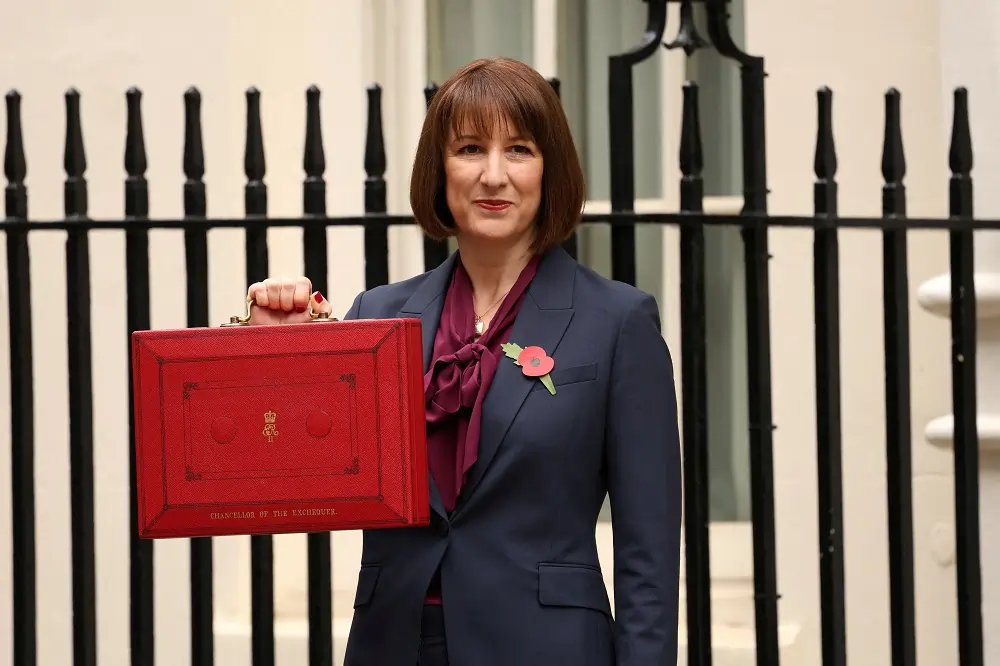Inflation-boosting UK budget hits bets on Bank of England rate cuts
Published by Jessica Weisman-Pitts
Posted on October 31, 2024
4 min readLast updated: January 29, 2026

Published by Jessica Weisman-Pitts
Posted on October 31, 2024
4 min readLast updated: January 29, 2026

By Andy Bruce
LONDON (Reuters) -Higher inflation fuelled by Britain’s new big-spending budget plans is likely to prevent the Bank of England from cutting interest rates over the next year by as much as investors had expected, hitting government bond prices on Thursday.
New finance minister Rachel Reeves announced the biggest tax increases in three decades in her first budget on Wednesday, saying she needed to spend heavily to repair the country’s public services, which she described as “broken.
Britain’s independent budget forecaster said her plans would boost the size of the world’s sixth-largest economy in the short run but raise inflation too, adding half a percentage point to the rate of consumer price growth next year.
Even before the budget, investors had singled out Britain as an inflation outlier because of high wage growth and strong price pressures from domestically produced services.
The Office for Budget Responsibility (OBR), whose forecasts underpin British government budgets, now expects inflation will average 2.6% next year, compared with a previous 1.5% forecast.
That prompted investors to reel in bets that the BoE will reduce interest rates rapidly over the next year.
Investors still think the central bank is likely to cut Bank Rate on Nov. 7 by a quarter of a percentage point – rate futures were pricing a roughly 80% probability on Thursday, down from 95% before the budget.
Reeves’ plans sowed greater doubt about the outlook for rate cuts in 2025, causing short-dated British government bonds to extend Wednesday’s selloff.
Two-year gilt yields were 10 basis points higher on the day at 4.42% and 10-year yields touched their highest in nearly a year at 4.44%, up 9 bps.
“Demand and inflation will be higher than expected over the BoE’s two-year forecast horizon, and this will now make it harder for the Bank to deviate from its gradualist mantra on rates,” said J.P. Morgan economist Allan Monks.
Markets on Thursday priced fewer than four quarter-point cuts from the BoE between now and the end of next year, down from nearly five before the budget.
By comparison, they are still pricing almost five further quarter-point cuts from the U.S. Federal Reserve and European Central Bank – both of which have already slashed borrowing costs more aggressively than the BoE.
BOE FACES LAST-MINUTE BUDGET SCRAMBLE
The BoE is a week away from its Nov. 7 rate decision and by now its staff would typically have a final draft of their quarterly economic forecast update ready for review.
Policymakers are due to start discussing their interest rate decision this Friday, and BoE economists are now likely to work through the weekend to update their forecasts with the budget.
Earlier this month, Governor Andrew Bailey said the BoE could move more aggressively to cut interest rates, but only if inflation pressures continued to weaken.
If the (Monetary Policy Committee) agrees with the OBR’s verdict that GDP growth will be higher next year, this may make it harder to build a narrative that would justify faster rate cuts over the coming year,” Andrew Goodwin, chief UK economist at consultancy Oxford Economics, said.
The OBR said Reeves would only meet her new fiscal rules by a slim margin, and bumped up its forecasts for Bank Rate and government bond yields as well as for inflation and growth.
Some investors think the negative bond market reaction to the budget will prove short-lived.
“We continue to like gilts,” said PIMCO economist Peder Beck-Friis. “Over time, we expect the market to price in a lower terminal rate for the Bank of England’s cutting cycle.”
James Smith, developed markets economist at ING, said he thought gilt prices had fallen too much.
The BoE’s response to fiscal loosening, both earlier in 2024 and this time last year, was fairly muted. In other words, we still think it will deliver more aggressive rate cuts than markets now expect,” Smith said.
(Reporting by Andy Bruce; Editing by Jamie Freed, William Maclean)
Inflation is the rate at which the general level of prices for goods and services rises, eroding purchasing power.
Gross Domestic Product (GDP) is the total value of all goods and services produced in a country over a specific time period.
Interest rates are the cost of borrowing money or the return on savings, expressed as a percentage of the principal.
Monetary policy refers to the actions taken by a country's central bank to control the money supply and interest rates.
The Bank of England is the central bank of the United Kingdom, responsible for issuing currency and managing monetary policy.
Explore more articles in the Top Stories category











